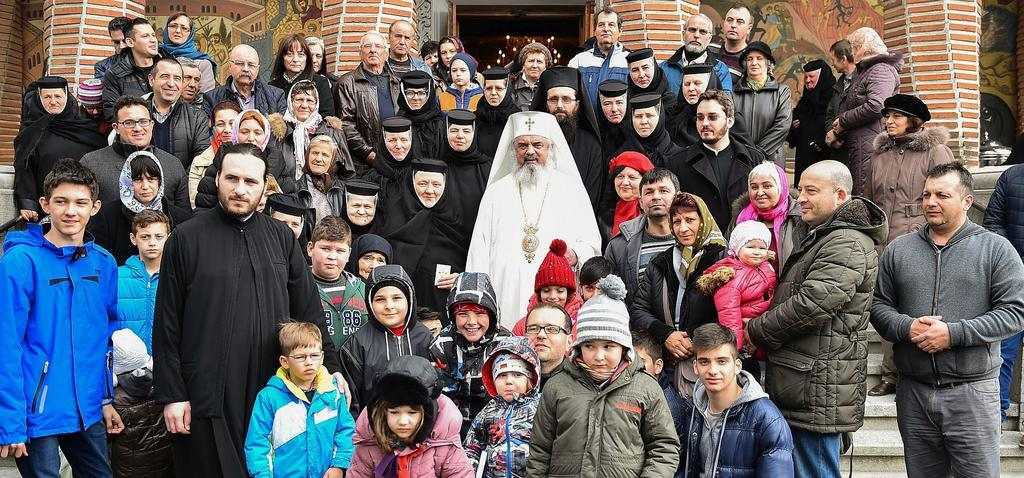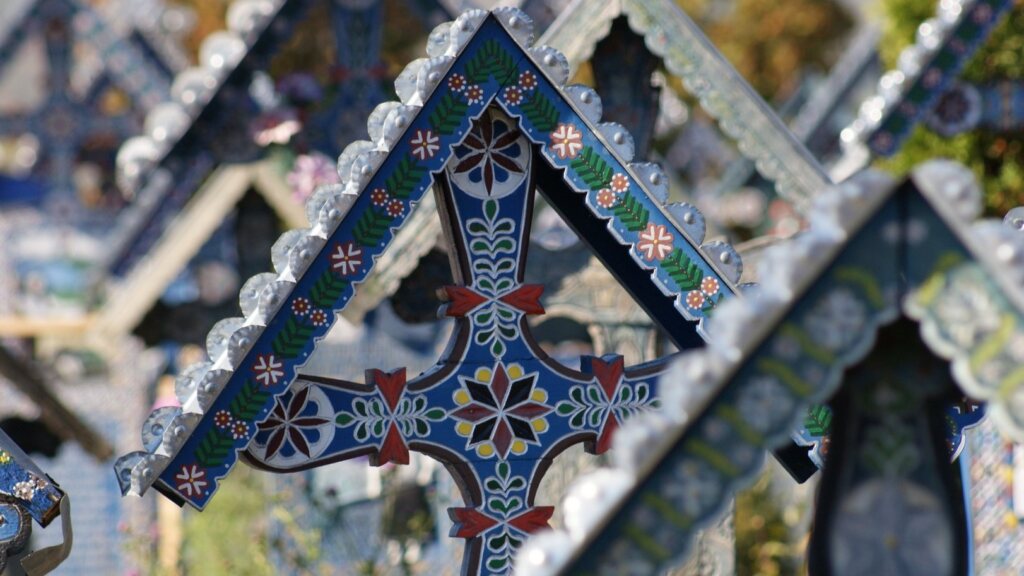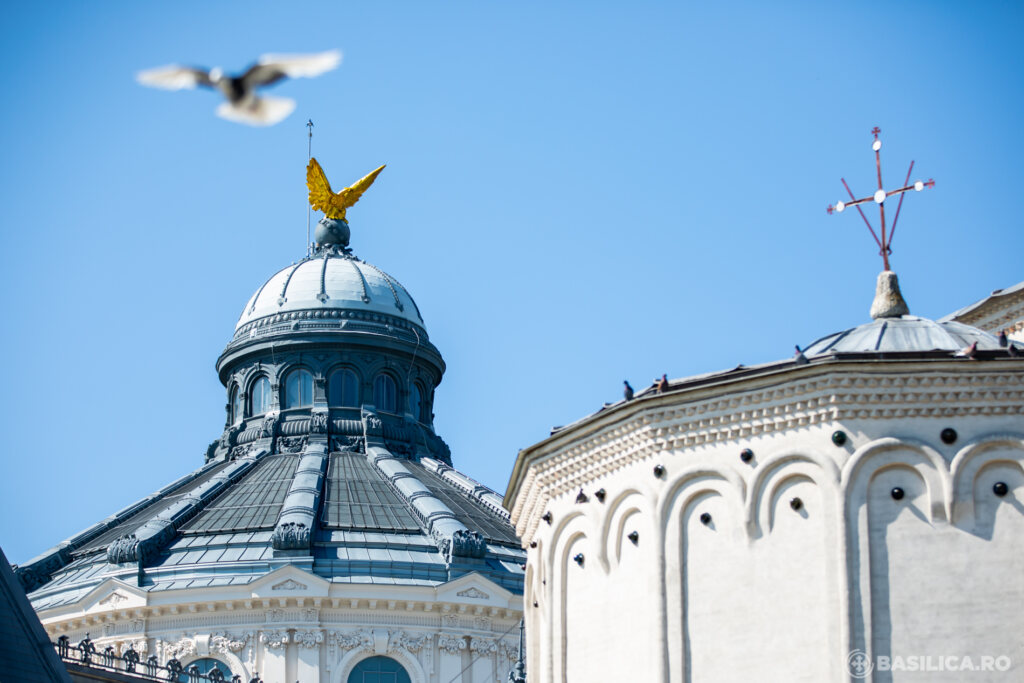Today, 15 March 2015, the 3rd Sunday of the Lent, also called Sunday of the Holy Cross, His Beatitude Daniel, Patriarch of the Romanian Orthodox Church visited the monastic community of Samurcasesti Monastery, where he participated in the celebration of the Divine Liturgy.
To end with the celebration, the Patriarch of Romania spoke about the spiritual meaning of the mystery of the Holy Cross for our spiritual life and for our salvation: “Jesus Christ, our Lord shows us that anybody who wants to come after Him, must deny himself/herself first, assume his cross, and follow Him. Thus, self denial, carrying or assuming the cross and following Christ are the three conditions to be Christian and get salvation”.
Self denial means getting rid of the selfish way of living
His Beatitude explained what self denial means and showed that this is the first condition to be a disciple of Christ: “The very term of self denial is hard to understand by today’s man. In an individualistic world, where one’s self is affirmed and selfishness is cultivated, as greed of profit and pride too, self denial, as spiritual programme of giving up selfishness means something hard to accept. Yet, Jesus Christ, our Saviour, says that the first condition for following Him, namely the first condition to be His disciple, is self denial. However, self denial does not mean one’s dissolution or annulment, but changing the selfish way of living. Self denial means giving up one’s selfish and passionate way of living only for oneself, forgetting about God and about poor people. Christ, our Lord shows us, in fact, that only when we do no longer focus our life on us, but on Him, we can follow Him. When man’s life is no longer focused on his own possessive self, temporary and limited, but on the relationship of eternal infinite love with Christ, God-the-Man, then the man’s life becomes communion for eternity, openness to eternal spiritual enrichment in the eternal love of the Most Holy Trinity”.
Assuming one’s own cross means recognising one’s own helplessness, as well as the desire to overcome sin
His Beatitude Daniel showed that “the second condition is the assuming of the Cross: “The Cross has lots of spiritual meanings in the Holy Scriptures. In today’s Gospel, the Cross may mean the admittance of one’s own helplessness or limits and assuming the personal sufferance. The cross is very often helplessness or dissatisfaction, an incurable disease, unhealed passion, sadness because we have not become or achieved what we wanted to. Very often the cross in the human’s life may be childhood without parents, family life without children, or lifelong widowhood. The cross may also be a handicap as a result of an accident. The Cross may also be a lifelong sorrow caused by the loss of a dear person. The cross may be lived in many ways as a helplessness, dissatisfaction or sufferance that marks the human’s life. Yet, when Jesus Christ, our Saviour, urges everybody ‘to take his/her cross”, this means: “take, accept, carry your helplessness, and follow Me! Present Me your sorrow, helplessness, disease, effort, fight against yourself and your helplessness!” Thus, Christ wants to bear our sufferance together with us, to fill our tormenting sufferance with His loving, saving and deifying presence. He, God – the Doctor – wants to get into our life to heal the helplessness of our soul and body and to give us His divine-human life, namely salvation. He wants to help us bear the Cross of sufferance to get the joy of Resurrection. He wants our sorrow, trial, helplessness or sufferance not to separate us from God, but use all this to come closer to God (…). Father Dumitru Staniloae says that, from a spiritual point of view, the cross is the desire or strong will to reject temptation, to fight against sin, be steady in faith and in good deeds. In other words, the Cross is sufferance designed to reach victory, and fight for growing the devoted love for God and for the fellow beings”.
Following Christ through faith and love for God changes sufferance into hope
“It is only Christ who can change our cross into a stair to heaven, into a chance of spiritual elevation from sin and sufferance, through His working and healing power inside our sufferance and helplessness. Christ, our Saviour, bears our cross together with us and changes it, namely gives sense to our sufferance as our place of meeting Him, the Crucified and Risen One. Thus, our cross is changed into the light of the soul and into ascension to resurrection, as sense and sensitivity to live the mystery of the human existence in communion of love. When the cross of sufferance is carried with faith in God and with love for God, sufferance joins the hope of healing and salvation. Even if somebody suffers from an incurable disease and he/she knows that it will not be healed, he/she changes sufferance into victory through the fact that he/she remains united with Christ and receives salvation and eternal life. Salvation and eternal life are more precious than the body’s good health and long life on the earth. All troubles bring us closer to God if we pray more during our trials, repent more and do more good deeds around. Those who do not pray when they pass through trouble, disease, and sufferance and do not hope in God’s help often reach despair. Lots of people committed suicide because they have not confessed their sins, have not prayed enough or have not had somebody close to them to pray for them”, His Beatitude also said.
Religion class teaches the people how to live in the love of God
His Beatitude Patriarch Daniel thanked the parents and children who enrolled to the religion class and showed its importance: “We wish to thank the parents and children who enrolled to the religion class, with a good result. More children were enrolled now, than at the beginning of the school year. Why that? Because the parents better understood how important and necessary the religion class is, as it teaches the people how to live in the love of God. They should not live forgetting about God, but loving God. Everybody must understand that the air we breathe, the sun that shines over us, the water that helps us keep the life and crops of the earth represent the work of the merciful love for us. It was not us who created the sky and earth, sun and light, neither us, nor our parents or great grandparents, but they are the gift of God. Thus, the most important activity of the faithful man is gratitude, thanksgiving to God for everything around. In the Orthodox Church gratitude is called Holy Eucharist. Thus, when we celebrate the Holy Eucharist, we celebrate a thanksgiving act, a gratitude to God. Therefore, the children learn that God loves them and they answer His love, and God’s love is shown through good parents, educators, teachers and professors. This work of the merciful love is done through the humans’ hands.”
To end with, the Patriarch of Romania offered several liturgical books to Samurcasesti Monastery as a sign of esteem and blessing.






